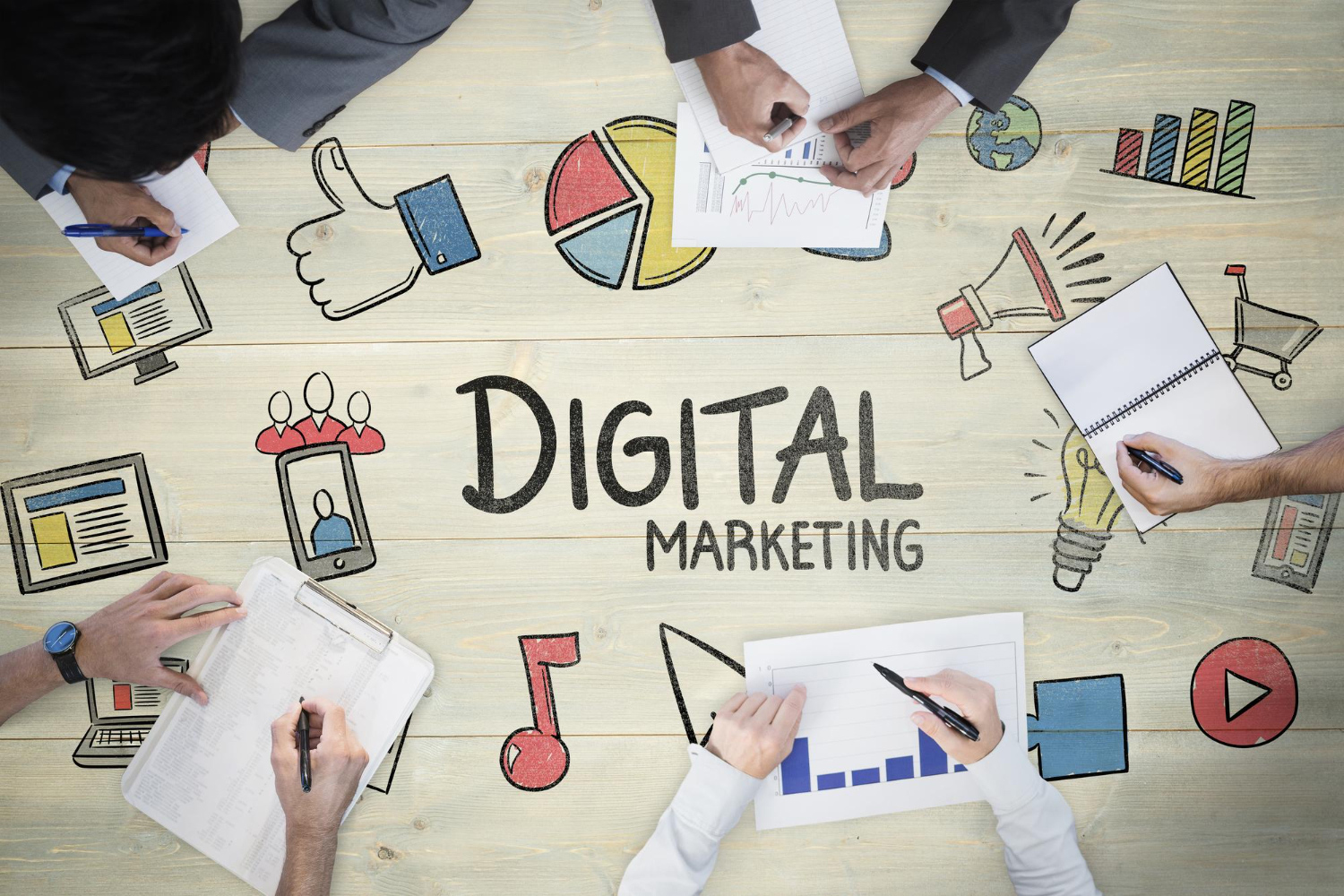Introduction:
In today’s digital age, businesses are increasingly recognizing the importance of having a strong online presence. A well-crafted digital marketing strategy is not just an option anymore; it has become a necessity for businesses to thrive in the competitive marketplace. With the vast array of tools and techniques available, it can be overwhelming to navigate the world of digital marketing. However, by understanding and implementing the key components of a successful digital marketing strategy, businesses can effectively reach their target audience, drive traffic to their websites, and ultimately achieve their business goals.
-
Digital Advertising:
Digital advertising has become an integral part of marketing strategies in today’s digital age. With the rise of technology and the internet, businesses have shifted their focus towards online platforms to reach their target audience. In this article, we will explore the world of digital advertising and its various aspects.
Digital advertising refers to the promotion of products or services through digital channels such as search engines, social media platforms, websites, and mobile applications. It encompasses a wide range of tactics and techniques aimed at capturing the attention and interest of potential customers.
One of the key advantages of digital advertising is its ability to target specific audiences with precision. Through data analysis and audience segmentation, advertisers can tailor their messages to reach the right people at the right time. This not only increases the effectiveness of campaigns but also helps businesses maximize their return on investment.
Furthermore, digital advertising offers a range of formats and mediums for delivering promotional content. From display ads on websites to sponsored posts on social media, advertisers have numerous options to choose from based on their objectives and target audience. This flexibility allows for greater creativity in crafting compelling advertisements that resonate with consumers.
Another significant aspect of digital advertising is its measurability. Unlike traditional forms of advertising where results can be difficult to track accurately, digital platforms provide detailed analytics that enable advertisers to monitor campaign performance in real-time. This data-driven approach allows for continuous optimization and refinement based on insights gathered from user engagement metrics.
However, it is important for advertisers to be mindful of certain challenges associated with digital advertising. Ad fraud, ad-blocking software, privacy concerns, and increasing competition are some factors that need to be considered. Advertisers must stay updated with industry trends and best practices to navigate these challenges effectively.
-
Search Engine Optimization (SEO):
Search Engine Optimization (SEO) is a crucial aspect of digital marketing that focuses on improving a website’s visibility and ranking on search engine results pages (SERPs). By implementing various strategies and techniques, SEO aims to increase organic traffic to a website, ultimately leading to higher conversion rates and business growth.
Keywords play a significant role in SEO. These are specific words or phrases that users enter into search engines when looking for information or products online. By strategically incorporating relevant keywords into website content, meta tags, headings, and URLs, businesses can optimize their web pages to align with user search queries.
In addition to keyword optimization, other important SEO practices include creating high-quality and engaging content, optimizing page load speed and mobile responsiveness, building backlinks from reputable websites, improving site navigation and user experience, as well as leveraging social media platforms for increased visibility.
Implementing effective SEO strategies can help businesses improve their online presence, attract targeted traffic from search engines like Google or Bing, and ultimately drive more conversions. It is an ongoing process that requires continuous monitoring and adaptation to stay ahead of the competition in the digital landscape.
-
Social Media Marketing (SMM):
Social media platforms have revolutionized how businesses connect with their target audience. Through strategic social media marketing campaigns on platforms like Facebook, Instagram, Twitter, LinkedIn, and more; businesses can engage with their audience directly while building brand loyalty and generating leads.
Social media marketing (SMM) is a powerful strategy that businesses use to promote their products or services on social media platforms. With the rise of social media platforms such as Facebook, Instagram, Twitter, and LinkedIn, SMM has become an essential part of any successful marketing campaign.

SMM involves creating and sharing content on social media platforms to engage with the target audience. This content can be in the form of text posts, images, videos, or even live streams. The goal of SMM is to increase brand awareness, drive website traffic, and ultimately generate leads and conversions.
One of the key advantages of SMM is its ability to reach a large audience at a relatively low cost. Social media platforms have billions of active users worldwide, providing businesses with an opportunity to connect with potential customers from all corners of the globe.
Moreover, SMM allows for precise targeting and segmentation. Businesses can tailor their content and advertisements based on factors such as demographics, interests, behaviors, and location. This enables them to reach their ideal customers more effectively and increase the chances of conversion.
Another benefit of SMM is its ability to foster two-way communication between businesses and their audience. Social media platforms provide a platform for users to engage with brands through comments, likes, shares, and direct messages. This interaction not only helps build brand loyalty but also provides valuable insights into customer preferences and feedback.
Social media marketing is an essential component of any comprehensive marketing strategy in today’s digital age. It offers businesses the opportunity to connect with a vast audience at a relatively low cost while fostering engagement and building brand loyalty. By leveraging the power of social media platforms effectively, businesses can drive growth and achieve their marketing objectives successfully.
-
Email Marketing:
Email marketing is a powerful tool used by businesses to communicate with their customers and promote their products or services. It involves sending targeted emails to a list of subscribers who have opted in to receive updates from the company.
The goal of email marketing is to build relationships with customers, increase brand awareness, and drive conversions. It allows businesses to reach a large audience directly in their inbox, providing an opportunity for personalized communication.
Email marketing campaigns can be tailored based on customer segmentation, demographics, or past purchase behavior. By creating personalized email campaigns that provide value to subscribers through informative content or exclusive offers; businesses can drive conversions and retain loyal customers.
Key elements of an effective email marketing campaign include compelling subject lines, engaging content, clear call-to-action buttons, and mobile-friendly designs. Additionally, tracking and analyzing email metrics such as open rates and click-through rates can provide valuable insights for optimizing future campaigns.
Overall, email marketing remains a cost-effective and efficient way for businesses to connect with their audience and drive results.
-
Content Marketing:
Content is king in the digital world! Quality content creation is essential for attracting visitors to your website organically while establishing thought leadership within your industry niche. By consistently producing valuable blog posts, videos, infographics, and other forms of content; businesses can engage their target audience and build trust.
Content marketing is a strategic approach to creating and distributing valuable, relevant, and consistent content to attract and engage a defined target audience. It involves the creation and sharing of informative, entertaining, or educational content such as articles, blog posts, videos, social media updates, and more.
The goal of content marketing is to build brand awareness, establish credibility and trust with the audience, drive traffic to a website or landing page, generate leads, and ultimately convert those leads into customers. It focuses on providing value to the audience rather than directly promoting products or services.
By consistently delivering high-quality content that addresses the needs and interests of their target audience, businesses can position themselves as industry leaders and build long-term relationships with their customers. Content marketing also plays a crucial role in search engine optimization (SEO) by increasing website visibility in search engine results pages.
In today’s digital age where consumers are bombarded with advertising messages on various platforms, content marketing offers a more subtle yet effective way to connect with potential customers. By providing valuable information that solves problems or entertains the audience, businesses can attract attention organically and establish themselves as trusted sources of information in their respective industries.
-
Paid Advertising (PPC):
Paid Advertising (PPC) has become an integral part of digital marketing strategies for businesses across various industries. PPC, or pay-per-click advertising, is a model where advertisers pay a fee each time their ad is clicked on. This method allows businesses to drive targeted traffic to their websites and increase brand visibility.
One of the key benefits of PPC is its ability to deliver immediate results. Unlike organic search engine optimization (SEO), which takes time to build visibility and rankings, PPC campaigns can be set up quickly and start generating traffic almost instantly.
Furthermore, PPC offers precise targeting options that allow businesses to reach their desired audience based on factors such as demographics, interests, and search intent. This level of targeting ensures that ads are displayed to users who are more likely to be interested in the products or services being promoted.
Another advantage of PPC is its flexibility in terms of budget control. Advertisers have full control over how much they want to spend on their campaigns, allowing them to allocate resources effectively and adjust budgets based on performance metrics.
Additionally, PPC provides valuable data and insights that can help businesses refine their marketing strategies. Through analytics tools, advertisers can track metrics such as click-through rates (CTR), conversion rates, and return on investment (ROI). These insights enable businesses to optimize their campaigns for better results and make data-driven decisions moving forward.
-
Analytics & Measurement:
In the world of digital marketing, analytics and measurement play a crucial role in understanding the effectiveness of campaigns and strategies. With the vast amount of data available at our fingertips, it has become essential for marketers to harness this information to make informed decisions and optimize their efforts.
Analytics in digital marketing involves collecting and analyzing data from various sources such as website traffic, social media engagement, email campaigns, and more. By tracking key metrics like click-through rates (CTR), conversion rates, bounce rates, and return on investment (ROI), marketers can gain valuable insights into consumer behavior and campaign performance.
Measurement is not just about gathering data; it’s about interpreting that data to uncover trends and patterns. Through careful analysis of the collected information, marketers can identify what is working well and what needs improvement. This enables them to make data-driven decisions that lead to better targeting, messaging optimization, budget allocation adjustments, and overall campaign success.
The ability to track user interactions across different channels allows marketers to understand customer journeys better. By utilizing tools like Google Analytics or social media analytics platforms, they can determine which channels are driving the most traffic or conversions. This knowledge empowers them to allocate resources effectively and target their audience where they are most likely to engage.
Ultimately, analytics and measurement provide marketers with a solid foundation for making strategic decisions in their digital marketing efforts. By leveraging data analysis techniques and tracking relevant metrics consistently over time, businesses can optimize their campaigns for maximum impact while ensuring a positive return on investment.
Conclusion:
In today’s fast-paced digital landscape, a successful digital marketing strategy requires a holistic approach that incorporates various components such as digital advertising, SEO, SMM, email marketing, content marketing, PPC campaigns, and analytics & measurement. By understanding the importance of each component and how they work together synergistically; businesses can effectively reach their target audience while achieving their business goals. Embracing these key components will not only help businesses stay competitive but also pave the way for long-term success in the ever-evolving world of digital marketing.
Check Out Our Previous Blogs – https://webhubsolution.com/6-steps-for-branding-strategy/
Find Out More – https://en.wikipedia.org/wiki/Email_marketing


Error: Contact form not found.